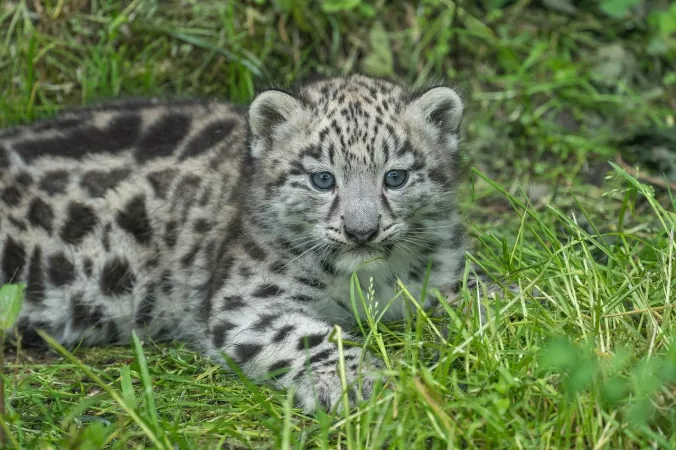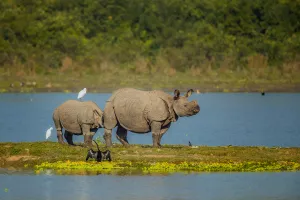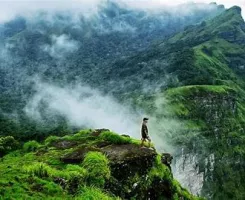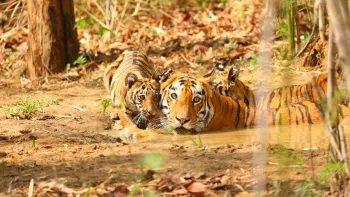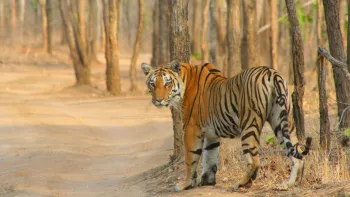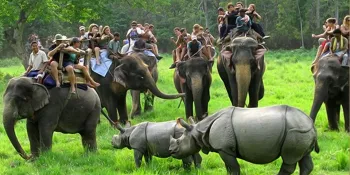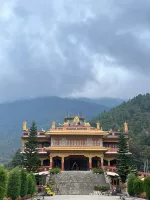Balpakram National Park Travel Guide
Balpakram National Park, located in the Garo Hills of Meghalaya, India, is a haven for nature lovers and wildlife enthusiasts. Known for its rugged terrain, deep gorges, and unique flora and fauna, this park offers a truly immersive experience in the lap of nature.Top Attractions in Balpakram National Park
- Rich biodiversity with rare and endangered species
- Spectacular views of the Balpakram Plateau
- Nokrek National Park - home to the elusive Red Panda
- Chitmang Falls for a refreshing dip
- Exploration of the sacred Simsang River
Balpakram National Park is Famous for
Its rich biodiversity and conservation efforts, preserving the unique flora and fauna of the region.Top Attractions in Balpakram National Park
- Spotting rare wildlife species like the Asian Elephant and Clouded Leopard
- Trekking through the rugged terrain and dense forests
- Interacting with the local Garo tribes and learning about their traditions
- Experiencing the tranquility of nature away from the hustle and bustle of city life
What's Great about Travelling to Balpakram National Park?
- Perfect for nature enthusiasts and wildlife lovers
- Opportunity to explore off-the-beaten-path destinations
- A chance to immerse yourself in the rich culture and traditions of the Garo tribes
What's Not So Great about Travelling to Balpakram National Park?
- Limited accommodation options within the park
- Rough terrain and challenging trekking paths may not be suitable for everyone
- Remote location with limited access to modern amenities
Travel Tips for Balpakram National Park
- Obtain necessary permits and permissions for entry into the park
- Wear comfortable clothing and sturdy footwear for trekking
- Carry sufficient water and snacks for the journey
Important Balpakram National Park trip information
- Ideal Duration: 3-4 days to explore the park thoroughly
- Best Time to Visit: November to March for pleasant weather
- Nearby Airports and Railway Stations: Guwahati Airport and Guwahati Railway Station
Per Person
24,400
*EXCLUDING APPLICABLE TAXES Per Person
34,990
*EXCLUDING APPLICABLE TAXES Per Person
18,000
*EXCLUDING APPLICABLE TAXES Per Person
15,000
*EXCLUDING APPLICABLE TAXES Per Person
19,000
*EXCLUDING APPLICABLE TAXES 5.0 Ratings
( 8 Reviews )
( 8 Reviews )
FAQ's on Balpakram National Park
Q1: What is the best time to visit Balpakram National Park?
The best time to visit Balpakram National Park is during the winter months from November to February when the weather is cool and pleasant, making it ideal for wildlife sightings and trekking. Avoid the monsoon season from June to September due to heavy rainfall which can make the terrain challenging to navigate. The park is closed during the summer months from March to May for safety reasons due to the high risk of forest fires.
Q2: Do I need a visa to travel to Balpakram National Park?
Travelers to Balpakram National Park will need to obtain an Indian visa as the park is located in the state of Meghalaya, India. Visa requirements vary based on your nationality, so it is advisable to check with the Indian embassy or consulate in your country for specific details. Some nationalities may be eligible for an e-visa or visa on arrival, but it is essential to confirm this before your trip.
Q3: What are the must-visit attractions in Balpakram National Park?
Balpakram National Park is known for its stunning landscapes and diverse wildlife. Must-visit attractions include the Nokrek Biosphere Reserve, Siju Cave, and the legendary Balpakram plateau known for its panoramic views. Wildlife enthusiasts can spot rare species like the Red Panda and Hoolock Gibbons in their natural habitat. The park also offers trekking opportunities to explore its rich biodiversity and experience the unique culture of the Garo tribe living in the region.
Q4: Is Balpakram National Park a safe place to travel?
Balpakram National Park is generally safe for travelers, but it is essential to follow safety guidelines provided by park authorities. It is advisable to stay on designated trails, avoid wandering off alone, and respect the wildlife and natural surroundings. Like any remote area, it is recommended to be cautious of your surroundings and take necessary precautions. Consult with local guides or authorities for updated information on safety measures.
Q5: What is the local currency in Balpakram National Park and can I use credit cards?
The local currency in Balpakram National Park is the Indian Rupee (INR). While credit cards may be accepted in some hotels or larger establishments, it is advisable to carry cash for smaller purchases and transactions. ATMs may not be readily available in remote areas, so it is recommended to withdraw enough cash before entering the park. Inform your bank of your travel plans to ensure seamless card transactions.
Q6: What is the local cuisine like in Balpakram National Park?
The local cuisine in Balpakram National Park reflects the flavors of Meghalayan tribal culture. Popular dishes include Jadoh (rice and meat dish), Pumaloi (steamed rice cake), and Nakham Bitchi (fermented fish chutney). Vegetarians can enjoy dishes like Tungrymbai (fermented soybean) and Ja Stem (local greens). Visitors can also savor local teas like Kwai (green tea) and Zan (fermented rice beer). Dietary considerations for travelers include the spicy nature of the food and the use of indigenous ingredients. Embrace the local flavors for an authentic culinary experience.
Q7: What transportation options are available in Balpakram National Park?
Transportation options in Balpakram National Park include buses, taxis, and private cars for traveling to the park entrance. Once inside the park, visitors can explore on foot or hire local guides for trekking expeditions. Public buses may operate to nearby towns, but it is recommended to arrange private transportation for convenience. Taxis are available for hire, but negotiate fares beforehand. Rental cars are not common within the park, so relying on local transport or organized tours is advisable for exploring the area.
Q8: Are there any cultural norms or etiquette I should be aware of when visiting Balpakram National Park?
When visiting Balpakram National Park, it is important to respect the local customs and traditions of the Garo tribe. Dress modestly, especially when visiting villages or religious sites, and ask for permission before taking photographs of people. Avoid touching or disturbing wildlife and plants in the park to maintain the ecosystem's balance. Greet locals with a friendly "Khublei" (hello) and engage respectfully in cultural exchanges. Participate in traditional activities like dance performances or handicraft demonstrations to support local artisans. Understanding and appreciating the rich cultural heritage of the region will enhance your travel experience in Balpakram National Park.
Q9: I am a travel agent. How can I buy travel leads of Balpakram National Park?
Register yourself as a travel agent at agents.tripclap.com and then you can buy travel leads to Balpakram National Park once your account is approved. For more details contact our support team at +91-8069186564 or support@tripclap.com
